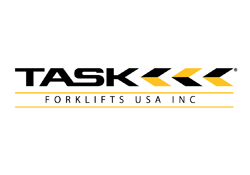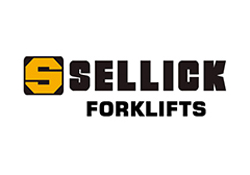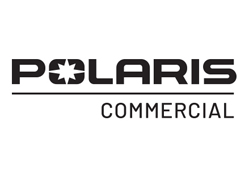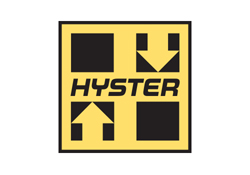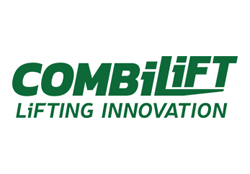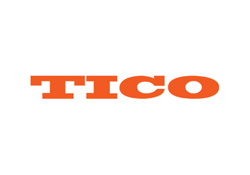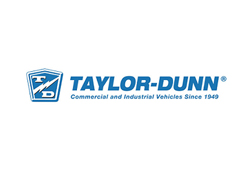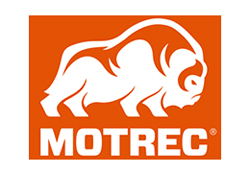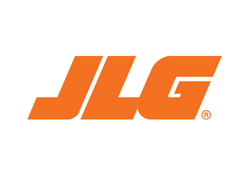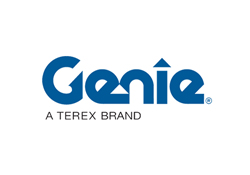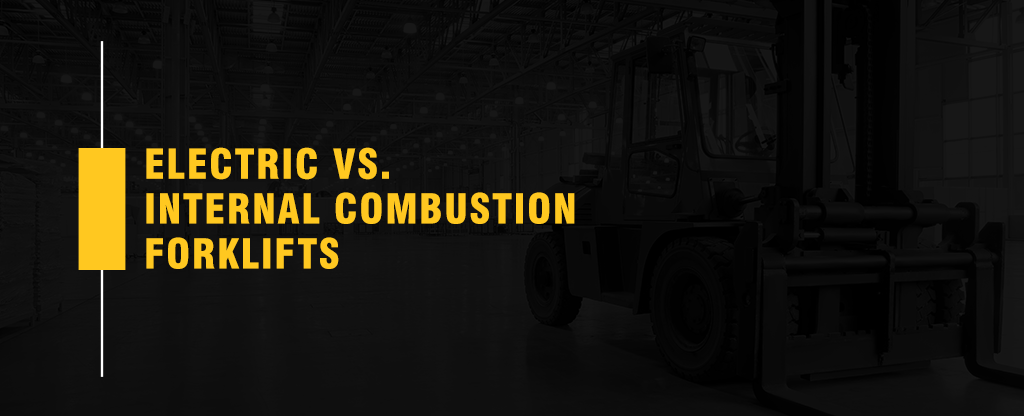
If you’re in the market for forklifts, you may want to learn more about the differences between electric vs. internal combustion forklifts. Before you invest, a gas vs. electric forklift comparison can help you discover which type of forklift is best for your needs.
Internal Combustion vs. Electric Forklifts
Your primary forklift options can be categorized into internal combustion forklifts and electric forklifts. Internal combustion forklifts, or gas-powered forklifts, run on gasoline and an internal combustion engine. These types of forklifts are primarily made to be used outdoors. As a result, they usually have a rugged construction, with the ability to withstand inclement weather and difficult terrain.
In contrast, electric forklifts run on electricity, with a battery supplying the power to the machine. Since these forklifts run on electricity, they need to be recharged consistently, with many companies choosing to charge them overnight. Electric forklifts are usually designed for indoor use, with many warehouses using them to transport pallets and other products. Both options come with advantages that make them ideal for different applications.
Pros and Cons of Internal Combustion Forklifts
The pros and cons of gas forklifts largely come down to their use of internal combustion engines, as these engines determine where the forklifts can be used safely and have some other features you’ll likely want to be aware of. Learn more about the pros of internal combustion forklifts below:
- Quick refueling: When you look at the pros and cons of propane forklifts or those powered by other kinds of gas, one of the big advantages is that they can be quickly refueled. In minutes, you can have a gas forklift with an empty fuel tank up and running — unlike an electric forklift that needs a longer period to recharge. The ability to quickly refuel these forklifts means you can use them at any time of the day or night for as long as you need them.
- Great for outdoor use: Gas-powered forklifts, like those produced by top brands Hyster and Yale, are usually built to be used outdoors. Their rugged construction makes them well-suited for various tough environments, allowing operators to utilize the forklifts in harsh weather and over uneven terrain. They’re also built with exceptional maneuverability, speed and lifting power.
- Lower investment costs: Part of the electric vs. diesel forklift or other gas-powered machine debate revolves around cost. A major advantage of internal combustion engine forklifts is their lower initial costs, which make them more accessible to purchase.
Some of the disadvantages of internal combustion forklifts include:
- Can’t be used indoors: Due to the emissions gas forklifts produce, operators can’t use them safely inside. These forklifts put out carbon monoxide, which can be dangerous to workers indoors. If you’re looking for a forklift that can be utilized for indoor applications, a gas-powered forklift isn’t going to be a great choice.
- More parts to replace and repair: Internal combustion engines will have more parts to repair and maintain over their life span. Since the forklift runs on more parts and liquids, it’s also much more likely that spills, leaks and breakdowns occur. These breakdowns can slow your operations and lead to costly maintenance expenses.
- High gas costs: One of the other factors you’ll likely want to consider is the cost of gas. The price of gasoline can vary, leading to increased expenses from time to time. You’ll probably need to refuel your gas forklifts daily, so the cost of gas will need to be added to your company’s annual budget.
Pros and Cons of Electric Forklifts
While you consider internal combustion engines or electric-powered forklifts, you should also be aware of the advantages and disadvantages of electric forklifts. Since batteries power these machines, they’re best for certain applications and environments. Learn more about the pros of electric forklifts below:
- Safe for indoor use and environmentally friendly: Electric forklifts from Yale and Hyster are made to be used indoors. They run on an electric battery, which doesn’t produce any chemical emissions or carbon monoxide. As a result, they’re much safer for indoor use. Since they don’t run on fossil fuels, they’re also more environmentally friendly.
- Quiet operation and superior maneuverability: Electric forklifts produce less noise than gas engines do. A battery-powered forklift is quiet and creates a minimal amount of noise. These forklifts also feature compact construction, with the battery providing a counterbalance to the rest of the forklift. This construction makes it easy for operators to maneuver in tight spaces and around a warehouse or other facility.
- Lower maintenance expenses: Electric-powered forklifts have lower maintenance costs than gas-powered forklifts, as there are fewer parts and fluids to maintain. You’ll usually only have to replace the battery every few years, leading to fewer maintenance costs over the equipment’s life span.
Some of the disadvantages of electric forklifts include:
- Higher upfront costs: Electric forklifts tend to have higher investment costs than what you’d pay for a forklift with an internal combustion engine. In addition to the higher upfront costs of purchasing an electric forklift, you’ll also have to factor in the costs of purchasing an industrial charger and the long-term electricity expenses.
- Built primarily for indoor use: Typically, electric forklifts are built to be used indoors and do not have capabilities for effective outdoor use. They’re constructed to drive on smooth floors, which presents an issue if you hope to use them outdoors on uneven terrain. Since they’re battery powered, rain and cold temperatures can damage the forklift’s electric components.
- Long recharge times: When you’re looking at electric vs. propane forklifts, consider the recharge times of electric forklifts. Typical electric forklifts can run for about eight hours before they need to be recharged. This recharge time can take another eight hours or more, leading to significant downtime for the forklift. If you’re looking to use your equipment for longer than eight hours a day, an electric forklift may not be the best option.
Which One Is Right for Me?
Gas or electric forklifts can be great options depending on the applications you plan to use them in. If you plan to use the forklifts primarily indoors, electric versions of the machines will probably be right for you.
However, if you want to use the forklifts outdoors and need to use them both day and night to meet tight deadlines, gas forklifts may be the better option. Ultimately, picking the right option for your company comes down to weighing the potential applications of the machines against the abilities of the different types of forklifts.
Find the Right Equipment at Gregory Poole Lift
Gregory Poole Lift is proud to provide our clients with equipment designed for various applications. Our wide selection of new and used equipment from top brands makes us the go-to supplier for many warehouses. When you choose Gregory Poole Lift, you can also expect to receive a consultative approach, where we work to find you the perfect piece of equipment for your company’s requirements.
Browse our selection of forklifts today to find the best one for your needs. If you have any questions, feel free to contact us.


